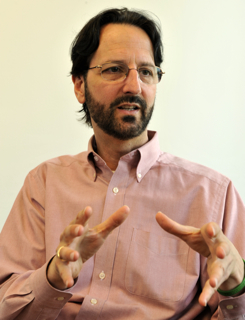Bryan G. Nelson has worked with young children, men, fathers and families since the 1980s. He is founding director of www.MenTeach.org and serves as faculty at Metropolitan State University in Minnesota. He is also a co-facilitator of the World Forum’s Men in Early Childhood Education project. He has received various awards including a fellowship to attend Harvard University to research men, fathers and children. He is a parent of a daughter.
Q: How important is reading to success in school and life?
A: We have so much data about how significant reading is to children, particularly how important it is for parents to read to, or along with, younger children. We know from neurological brain research that when you read to children you are helping them expand their synapses and develop vocabulary.
I’m sure that you know about Jeffrey Canada who has worked in Harlem, and how he has found that poor families with books around the house raise children with profoundly different vocabulary than those without books around the house. Reading can’t be underestimated; it’s so significant, particularly for boys.
Q: Why might both boys and girls benefit from more male teachers in the school system?
A: Children learn best from role modeled behavior and approaches (like the old adage, “Don’t do as I say, but as I do.”). Children learn by watching. If you have no male teachers in a child’s life, they’re not seeing men valuing education. It’s also so important for girls to see positive interactions between men and women, and seeing male and female teachers interacting can provide a positive image of a man.
Q: Is there a robust movement to get more male teachers into the schools?
A: There is a significant movement going on not only in North America but also throughout the world. For example, Germany recently spent $17 million on an initiative to get more men into elementary education teaching.
As for the success of the movement, time will tell. We do see more men going into education. Some of that could be timing. Historically the greatest increases in men in education were: 1) during the Depression in the 1920s and 1930s, and; 2) right after World War II. Both of those circumstances are being repeated right now: a Great Recession for many parts of the world, and many men coming back from wars overseas.
Q: What issues are holding male teachers back from being hired, and what can parents do about that?
A: MenTeach.org did a national study and found three main reasons: 1) stereotypes about gender 2) fear of false accusations and 3) low status, low pay. It’s not just one of those items; it’s the combination of all three. The biggest thing parents can do is treat male teachers with the same warmth, friendliness and thoughtfulness as they do female teachers. Have the same high expectations. Treat male teachers the same way you’d treat female doctors, female lawyers, female pilots.
Q: Do you have advice for parents interested in a more activist role – for instance, joining the school board?
A: First, recruit male teachers, and then welcome them. There are so many messages that men (as well as fathers) get when they go to a school, particularly an elementary school. Men aren’t made to feel welcome; they are immediately suspect when they go into a school. The other approach is to show up at the school as a parent. Be involved by visiting your child’s classroom.
Q: Studies have shown that when it comes to reading, the gender of the person reading is less important than the book being read. Your insights?
A: I have seen studies that indicate middle-grade boys do better with a male teacher. But that’s not my expertise; I can speak more from personal experience. I fell in love with books when I was at school, and I can still get totally immersed in reading with my children. I think reading is such a profound way of traveling inside your mind, through other people’s writing.
Q: Any parting thoughts?
A: It’s tricky when we bring in the topic of gender, because it often gets caught up in the sexism of our society. For example, I don’t see many studies about whether it’s positive or not to have a female pediatrician or pilot. What’s really significant is that children need diversity. When you go in the classroom and you are a Latino or an African American boy, and you look around and see primarily European-American women, why would you think education is a place for you? Women have done a great job teaching, but boys and young men don’t see themselves in the women who are teaching them. It’s not about men versus women, nor is it about girls versus boys. It’s about what’s best for all children and families and from my years of experience, children need strong caring men in their daily lives.

